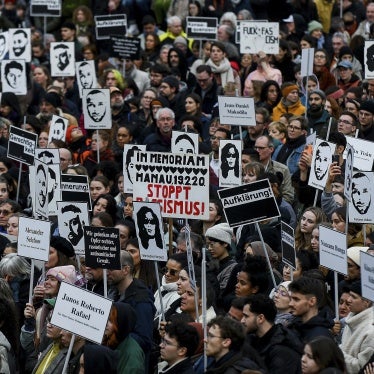Adel al-Jubair
Minister of Foreign Affairs
Ministry of Foreign Affairs
Riyadh, Kingdom of Saudi Arabia
Your Excellency,
We write regarding recent news reports stating that Prince Mohammed bin Nayef, Saudi Arabia’s former crown prince and interior minister, is currently under house arrest in Jeddah and is banned from leaving Saudi Arabia.
The New York Times New York Timesreported on June 28, 2017 that a former American official close to Mohammed bin Nayef says that following King Salman’s elevation of his son, Mohammed bin Salman, to crown prince on June 21, Mohammed bin Nayef returned to his palace in Jeddah to find that authorities had replaced his guards with other guards loyal to the new crown prince. He is reportedly not permitted to leave the palace. Another official said that the Mohammed bin Nayef is barred from leaving the country.
Human Rights Watch has documented Saudi Arabia’s rampant use of arbitrary travel bans and detentions of Saudi citizens over the years, including during Mohammed bin Nayef’s tenure as interior minister.
In imposing travel bansimposing travel bans, Human Rights Watch found that the Ministry of Interior has often broken Saudi law. Aside from a judicial ruling by a court, the minister of interior may impose bans “for defined reasons related to security and for a known period” and must notify those banned within one week of the ban. Human Rights Watch research has shown that many of those banned found out about their ban at airports, land crossings, and passport departments months or years after they were imposed. In many casesmany cases, the ministry does not inform those on the travel ban list of the specific reasons for subjecting them to the ban.
For example, in December 2014, authorities banned prominent human rights activist banned prominent human rights activistSamar Badawi from travel abroad, several months after she went to Geneva to press the United Nations Human Rights Council to seek the release of her then-husband, Waleed Abu al-Khair, who is serving a 15-year prison sentence for his human rights work. She only discovered the ban when she attempted to fly out of the country from Jeddah’s King Abdulaziz International Airport, and never obtained a justification from authorities for the ban. The ban remains in effect at this writing.
Under international human rights law, everyone is free to leave and return to his or her country. Article 13 of the Universal Declaration of Human Rights (UDHR) gives “everyone […] the right to leave any country, including his own, and to return to his country.” The International Covenant on Civil and Political Rights bars states from restricting someone’s right to leave the country, except when the restrictions are prescribed by law, and are “necessary to protect national security, public order, public health or morals or the rights and freedoms of others.”
Human Rights Watch has also documented the use of arbitrary detention in Saudi Arabia. In early 2013, the Saudi interior ministry launched the Nafetha Tawasol (communication window) website, a regularly updated online database that purports to document detainees in Saudi prisons, without identifying them, and the status of their cases.
Human Rights Watch analyzed data from the portal as it appeared on May 15, 2014, when it showed 2,766 people in detention. These included 293 detainees who criminal justice officials had apparently held in pretrial detention for over six months without having referred their cases to the judiciary. It appeared that 16 of these 293 detainees had been held for over two years without having their cases referred to the judiciary, including one Saudi citizen who authorities had held in such pretrial detention for more than ten years. The database showed almost 700 others whose cases had been progressing through the Saudi court system for unreasonable lengths of time, of whom at least 177 appeared to have been awaiting trial verdicts for over ten years.
Article 114 of Saudi Arabia’s Law of Criminal Procedure (LCP) provides that a person may be held in detention without charge for a maximum of five days, renewable up to a total of six months by an order from the Bureau of Investigation and Prosecution. After six months, article 114 requires that a detainee “be directly transferred to the competent court, or be released.”
Yet the data on the website as of May 15 revealed that 31 people listed had been held while merely “under investigation” for more than six months.
The Arab Charter on Human Rights, which Saudi Arabia ratified in 2009, also guarantees the right of anyone arrested or detained on a criminal charge to be brought promptly before a judge or other officer of the law, and to have a trial within a reasonable time or be released. The charter says that “Pretrial detention shall in no case be the general rule.”
Extended detention without charge or trial or without an appearance before a judge is arbitrary, and violates both Saudi law and international human rights standards.
We understand that the Ministry of Foreign Affairs stated that Times report is “baseless and false,” but we write seeking further clarification on Prince Mohammed bin Nayef’s status. We respectfully request that the ministry clarify whether authorities permit Prince Mohammed to exercise freedom of movement inside Saudi Arabia, as well as well as whether authorities have imposed on him a travel ban.
If authorities have imposed movement restrictions on Mohammed bin Nayef, please confirm the legal basis of each of these restrictions.
Sincerely,
Sarah Leah Whitson
Executive Director
Middle East and North Africa
Human Rights Watch








